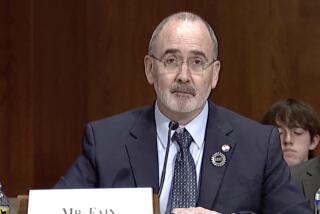Fluor Will Test 4-Day Workweek for the Summer
- Share via
IRVINE — To give employees a special bonus while helping to fight air pollution, the Fluor Corp. has decided to try out a rotating, four-day workweek this summer, company officials said.
Mark Krouse, director of human resources for the Irvine-based engineering and construction giant, said all of Fluor’s 2,100 corporate headquarters employees will be eligible for the new schedule, which will begin June 4.
The pilot project, which will give employees every other Friday off by extending the remaining workdays by one to two hours, has received wide support from Fluor employees, Krouse said.
Fluor officials said a recent employee survey showed that 94% of those who responded favored implementing the program throughout the Irvine headquarters. Under state labor law, two-thirds of a work force must concur before a private employer can make a significant change in work schedules.
About 35 employees at Fluor’s Irvine computer center have been working on the alternate schedule for the past 18 months with satisfactory results, Krouse said.
Fluor is among a growing number of companies that are gingerly experimenting with non-traditional workweeks to meet new air-quality regulations without disrupting their business operations, according to Tom Eichhorn, spokesman for the South Coast Air Quality Management District.
“There is a trend toward shortened workweeks to comply with the AQMD’s trip-reduction regulation,” Eichhorn said, referring to the requirement for companies with 100 or more employees in the Los Angeles Basin to draft plans to reduce commuter trips.
Employers that have opted to use compressed workweeks on a permanent basis include Mitsubishi Consumer Electronics, a 600-employee company in Santa Ana that has been on a four-day workweek for nine years, and Bechtel, whose 600 employees in Norwalk are on a schedule similar to the one that Fluor plans to enact.
Fluor is one of the largest private employers in Southern California to experiment with a compressed workweek. The city of Los Angeles has 13,300 employees--or 31% of its work force--on alternative work schedules.
Krouse said Fluor decided to try the program during the summer because that is when most people would like the extra time to spend with families or friends.
“We tried to tie it (the pilot program) to summer, when children aren’t in school,” he said. With the new schedule, Fluor employees will get seven extra three-day weekends this summer.
Jeanne Woodward, a secretary at Fluor, plans to spend her extra days off with her three teen-agers at home in Laguna Hills. She said the longer workdays will be “more productive because I will be able to stay and complete things at hand.”
Fluor officials considered several potential drawbacks to the program before deciding to proceed, Krouse said. Because of concerns about having employees head home during peak commuting hours and after many child-care services close, Fluor decided not to go to a four-day-a-week, 10-hour-day work schedule.
Under the new schedule, employees will put in nine-hour days from 6:45 a.m. to 4:30 p.m. Monday through Thursday, and eight hours on the Fridays that they work.
Krouse said a change in state labor law last year made it more economically feasible for Fluor to implement this alternate schedule. Before the law was changed, the company would have been required to pay overtime to employees who worked more than 40 hours each Monday through Friday.
The new law allows companies to design their own 40-hour workweeks, which need not span from Monday morning to Friday evening. This summer, for instance, Fluor will start its official workweek on Friday at 10:45 a.m.
Krouse said Fluor management and some customers had concerns about a possible loss of productivity or disruption of service as a result of the change in work hours.
In order to make all services at Fluor available five days a week, Krouse said, the start of the program will be staggered throughout each department. Any department that cannot operate efficiently on the new schedule will revert to the traditional workweek, he said.
“The game plan is to move forward with the alternative schedule, knowing there are some areas that probably won’t participate,” he explained.
Some employees will try the new schedule on a temporary basis, ending it on Sept. 4.
“If it is successful, we will probably see it come back again, probably next summer,” Krouse said. But he said he doubts that Fluor management will adopt the new schedule on a year-round basis.
More to Read
Inside the business of entertainment
The Wide Shot brings you news, analysis and insights on everything from streaming wars to production — and what it all means for the future.
You may occasionally receive promotional content from the Los Angeles Times.










